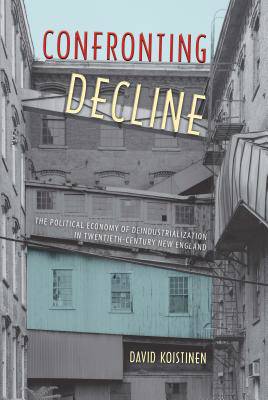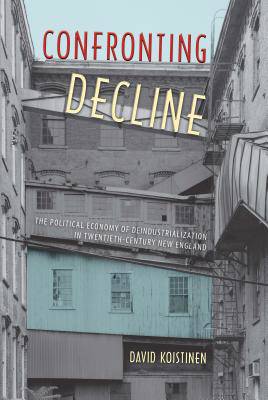
- Afhalen na 1 uur in een winkel met voorraad
- Gratis thuislevering in België vanaf € 30
- Ruim aanbod met 7 miljoen producten
- Afhalen na 1 uur in een winkel met voorraad
- Gratis thuislevering in België vanaf € 30
- Ruim aanbod met 7 miljoen producten
Confronting Decline
The Political Economy of Deindustrialization in Twentieth-Century New England
David KoistinenOmschrijving
"Koistinen puts the 'political' back in political economy in this fascinating account of New England's twentieth-century industrial erosion. First-rate research and sound judgments make this study essential reading."--Philip Scranton, Rutgers University-Camden
"Well-organized and clearly written, Confronting Decline looks at one community to understand a process that has become truly national."--David Stebenne, Ohio State University
"Koistinen's important book makes clear that many industrial cities and regions began to decline as early as the 1920s."--Alan Brinkley, Columbia University
"Sheds new light on a complex system of enterprise that sometimes blurs, and occasionally overrides, the distinctions of private and public, as well as those of locality, state, region, and nation. In so doing, it extends and deepens the insights of previous scholars of the American political economy."--Robert M. Collins, University of Missouri
The rise of the United States to a position of global leadership and power rested initially on the outcome of the Industrial Revolution. Yet as early as the 1920s, important American industries were in decline in the places where they had originally flourished.
The decline of traditional manufacturing--deindustrialization--has been one of the most significant aspects of the restructuring of the American economy. In this volume, David Koistinen examines the demise of the textile industry in New England from the 1920s through the 1980s to better understand the impact of industrial decline. Focusing on policy responses to deindustrialization at the state, regional, and federal levels, he offers an in-depth look at the process of industrial decline over time and shows how this pattern repeats itself throughout the country and the world.A volume in the series Working in the Americas, edited by Richard Greenwald and Timothy J. Minchin
Specificaties
Betrokkenen
- Auteur(s):
- Uitgeverij:
Inhoud
- Aantal bladzijden:
- 346
- Taal:
- Engels
- Reeks:
Eigenschappen
- Productcode (EAN):
- 9780813054087
- Verschijningsdatum:
- 1/11/2016
- Uitvoering:
- Paperback
- Formaat:
- Trade paperback (VS)
- Afmetingen:
- 156 mm x 234 mm
- Gewicht:
- 530 g

Alleen bij Standaard Boekhandel
Beoordelingen
We publiceren alleen reviews die voldoen aan de voorwaarden voor reviews. Bekijk onze voorwaarden voor reviews.











